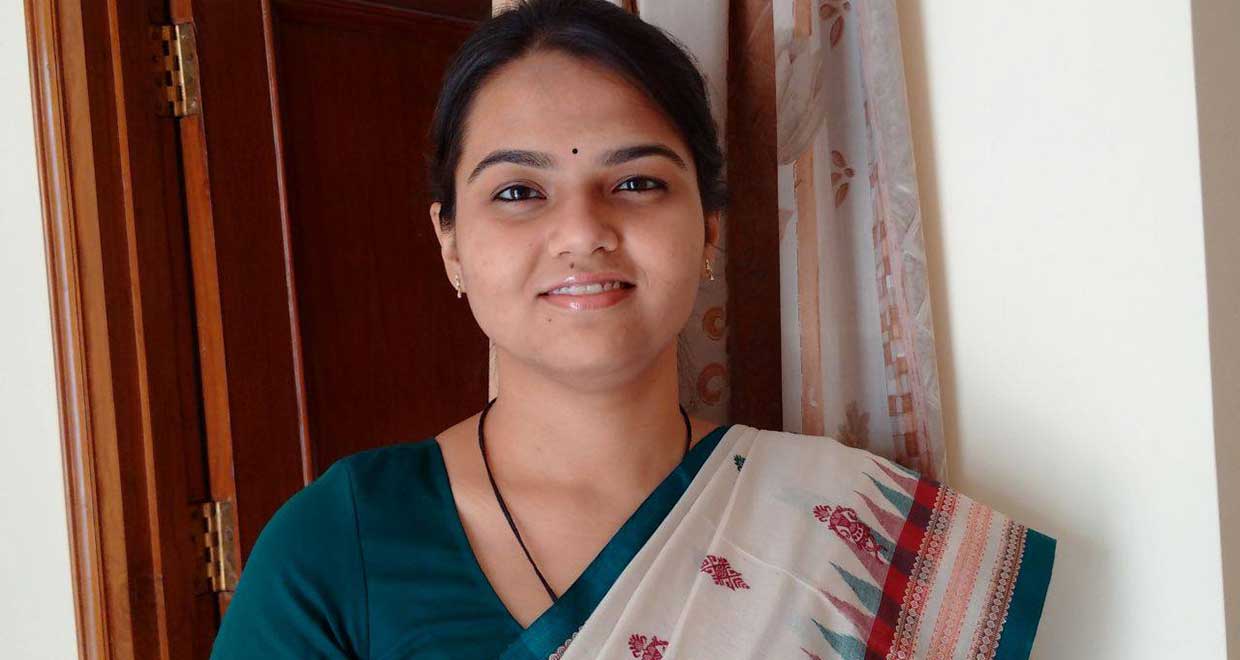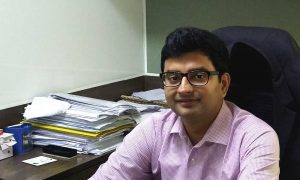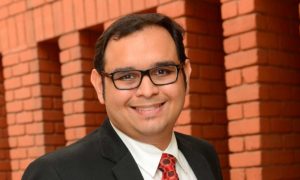Shatarupa Mishra graduated from Symbiosis Law School in 2013. She is a lawyer by interest, civil servant by profession and dancer by passion. Currently, she is training as an INDIAN REVENUE SERVICE OFFICER-Income Tax in National Academy of Direct Taxes, Nagpur after clearing Civil Service Examination 2014.
In this interview she talks to us about:
- How she developed interest in reading and writing.
- What inspired her to appear for civil service exam?
- When should a person ideally start preparation for the civil services exam?
- Easiest and toughest part for preparation.
- Aspects that a civil service aspirant must focus on and start preparing for in advance.
Please introduce yourself to the readers. Please tell us a little bit about your childhood and your background.
Hello friends! I am Shatarupa Mishra, lawyer by interest, civil servant by profession and dancer by passion. Currently I am training as an INDIAN REVENUE SERVICE OFFICER-Income Tax in National Academy of Direct Taxes, Nagpur after clearing Civil Service Examination 2014.
My schooling has been in De Paul School in a small town Berhampur and subsequently in St. Joseph’s High School, Bhubaneshwar, the capital. I was extremely active in extracurricular activities like writing, dancing and singing. Both me and my elder sister started training in Odissi, the classical dance of Odisha and other dance forms.
Infact I started performing in stage shows and dance festivals from a very young age of 4 years and those childhood memories of dancing remain the most cherished. I was also the house captain in my school.
What impressed upon you the idea to study law?
Frankly speaking, I wanted to pursue law when I realized after two years of science in intermediate level, I did not want to pursue Engineering or Medicine, the two most preferred options at that time. Browsing through the law syllabus in my +2 2nd years, my interest was piqued and I thought graduation in law would bode well for me. My choice was very instinctive and it worked out well.
How was your experience at Symbiosis Law School, Pune. What activities were you involved in apart from the regular academic curriculum?
My five years in Symbiosis Law School was very enjoyable and memorable. Right from academics to internships to pro-bono activities to extracurricular activities, Symbiosis gives you a wide platform for everything. From my 1st year itself, I took an active part in extracurricular activities like dancing and participated in many college fests. Timings of law school were such that we could pursue our other hobbies and interests in the later part of the day. Second year onwards, I started mooting and was fortunate enough to be a part of our college team in Jessups. Mooting piqued my interest in legal research and I subsequently wrote many legal essays in pre-final and final year. Being a part of the very active Human Rights Cell of our college for all five years, I loved teaching young kids from underprivileged background and spending time with them on weekends.
I loved learning law for the sake of itself and was extremely diligent about my studies and projects. The cherry on the cake was when I was awarded a scholarship for academic excellence in my fourth year and the Chancellors Gold medal for topping my batch in BA LLB course.
How did you develop your interest in reading and writing?
Reading was my favourite pastime since childhood. If I was not dancing, I was reading. Both my parents, grandparents are voracious readers and encouraged me to develop reading habit. At home there was already a huge library to pick books from. I have many pleasant memories of visiting book shops and exhibitions with my father and buying loads of books, all non-academic of course. If there was a book club in my city, I was a member in it. In school also, my favorite subject was English literature. My reading habit almost borders on obsession, my family tells me, ha-ha! In childhood, I started writing poems and subsequently, articles. My mother also writes poems in Odia language and she has been a major motivation behind my writing. Law School and preparation for civil service examinations only enhanced my interest and skills in writing articles.
When and what inspired you to appear for Civil Service Exam?
I believe it was a very conscious choice to appear for Civil Service Exam. I belong to a family of state and central civil servants, so somewhere the inspiration to be one myself was right at home. My biggest inspiration has been my father who is respected by all as an honest, upright and efficient officer in the State Government. Dinner table conversations have many a times, been about development, administration and issues therein. Secondly, I was keen to be in a profession which offered me a wide platform to work in law, policy and implementation. My legal training actually strengthened my resolve to sit for this examination. Thirdly the syllabus of the civil services exam piqued my interest, particularly the general studies papers. Keeping all these factors in mind, I eliminated other career options in law in fifth year of law school so that I would never regret the decision of appearing for this examination. I was fortunate that I got a mentor in Pune, Shri Aashay Abhyankar, who along with his family, has played a stellar role in my success.
When did you start preparing for the exam? When should a person ideally start preparation for the civil services exam?
I started preparing for this examination immediately after graduating from law school in 2013. I really wanted to clear the examination in my first attempt itself and join the services at a young age so I wanted to give it my full focus the first time around.
As regards the second part of your question, I believe once the person is sure that this is what he wants to achieve, then that time automatically becomes the most ideal for preparation. Hence, to each his own.
How many hours did you put in for your preparations every day? Is having a fixed schedule or weekly targets important according to you?
I used to fix daily targets and accordingly work to complete them, so there was no fixed number of hours. On an average, it ranged from 6-8 hours daily. Rest of the time was spent in reading newspapers, surfing the net or carrying out other hobbies.
Yes having a fixed schedule and weekly targets is important as I have personally benefited from such meticulous planning.
Which were the easiest and toughest parts of your preparation?
The easiest part was reading newspapers and making notes from them and studying the general studies papers which are exhaustive but highly interesting as well. History, culture, polity, foreign affairs are topics that I loved to read and analyze. The toughest part for was staying away from my family, and friends as I was preparing in Pune while my family stays in Bhubaneshwar.
What are the aspects that a civil service aspirant must focus on and start preparing for in advance?
A civil service aspirant should first know how to read the newspaper for this examination. Then preparation becomes very easy and interesting as one can interlink concepts with current affairs, analyze and present in a unbiased manner. My preparation for civil services was very newspaper-oriented and it held me in good stead throughout all three levels.
What were the attributes of your legal education and background which helped you in succeeding in the civil service exam?
I would attribute my success in first attempt to legal education in a lot of ways. As law students, we are used to processing copious amounts of information and presenting them in answers. Secondly writing subjective answers in limited time, a skill acquired during law school, is an asset while writing the Civil Services (Main) Examinations. In all my mock tests and the mains examination I never faced the issue of time management. Thirdly, integrated law course already gives you an insight into general humanities subjects in the initial years like political science, history, sociology, etc which is somewhat registered in your mind. The only catch here is to keep legalese and biased viewpoints out of your preparation and remembers that this examination wants administrators and not lawyers at the end of the day and moulds yourself accordingly.
What is the importance of CGPA for law students especially for Civil Service exam aspirant? Does it make any difference during the interview?
More than CGPA, it is the grasp over syllabus and overall analytical skills that matter most for law students in civil service examination. Having said that, I believe a decent CGPA would always be an asset to the law student, be it in this examination, or legal jobs or pursuing higher studies, etc.
I can answer the second question only from my own experience. As I was the batch topper with a high CGPA, I was apprehensive that they could ask me a lot of law-related questions expecting accurate answers. And this is what happened I was asked factual questions spanning multiple law subjects. However, the interview experience is very subjective and nothing is a precedent.
Tell us about your interview? What kinds of questions were asked by the interview board?
My interview was on the afternoon session on 15th May, 2015. It was chaired by Prof. David Sylimlieh. As discussed above, mostly factual and legal questions were asked which I could answer racking law notes in my mind at that very instant.
What would be your message for law students who are preparing or planning to prepare to appear for the Civil Service exam?
I personally feel that with the hard work, perseverance and right guidance, it is not difficult for a law student to clear these Examinations. Civil Services involve law interpretation and implementation, public administration and management, which law students imbibe in their five-year long erudition. So they should approach this examination with full focus and determination, if they choose to appear for it. Success shall definitely follow.
Lastly, what would be your message for the readers who want to pursue career in Civil Services?
Readers wanting to pursue a career should first be clear about why they want to pursue it. Once they have decided, they should just focus and plunge into the syllabus with full determination. Enjoy the process of learning and studying for this examination and before you realize, success shall be yours! God Bless.


























